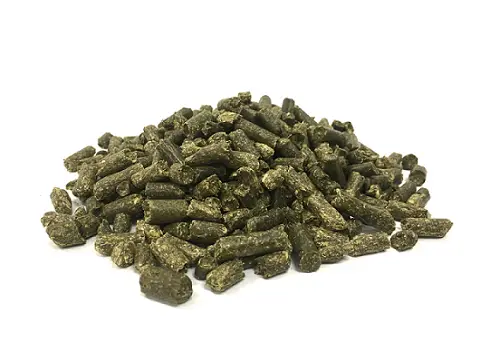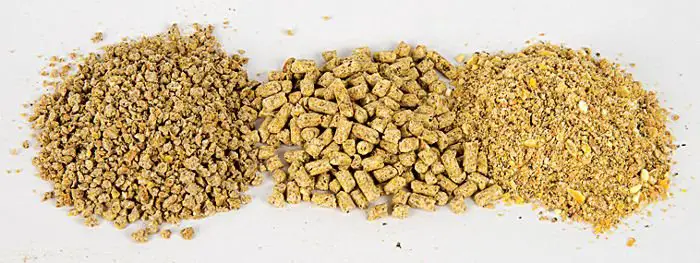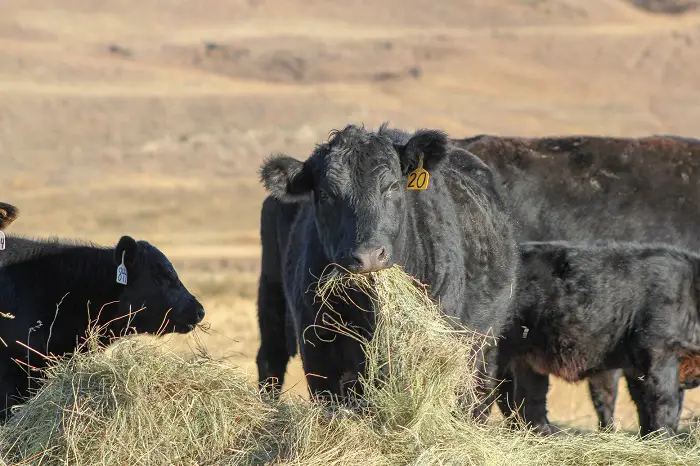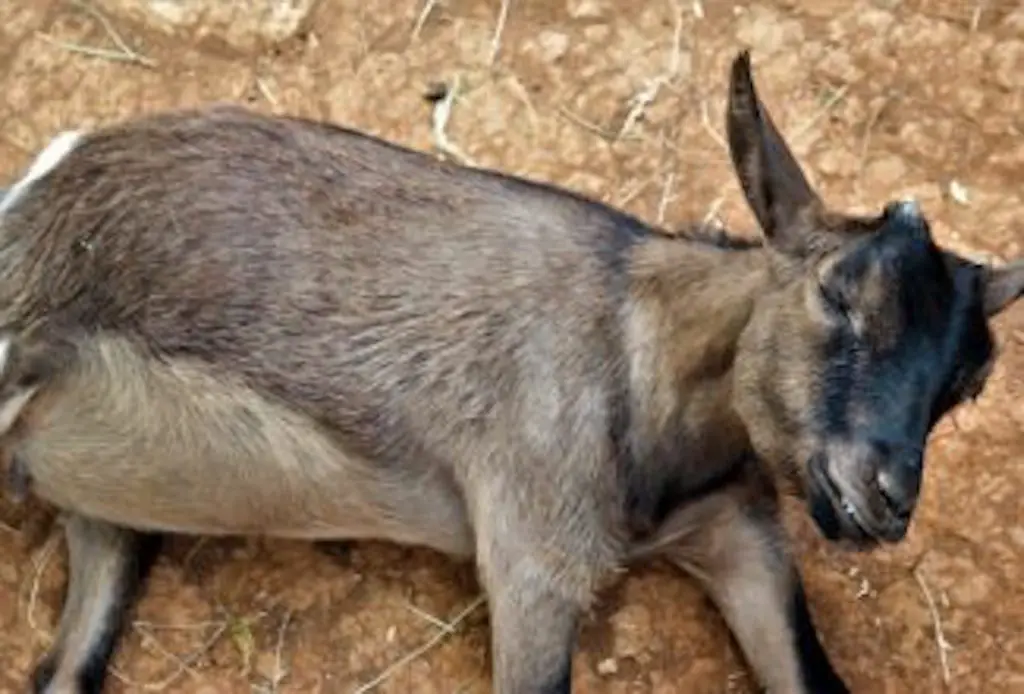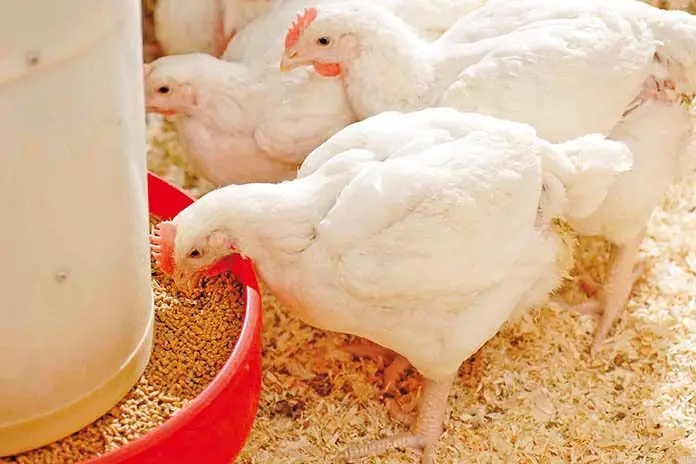Alfalfa also known as lucerne or affectionately as the queen of legume forages is unarguably the best forage protein supplement for sheep. Alfalfa is a herbaceous perennial legume with high yield and nutritional quality compared to other forage legumes. Alfalfa is mainly cultivated across the globe for hay and silage production for animal feeding, non-ruminants, and ruminants. Alfalfa hay is bulky and to improve transport and handling some of the hay is pelleted.
Contents
Digestion in Sheep
Sheep are ruminants by nature, meaning that they have a four-chambered stomach designed to digest high-fiber feed resources. The digestive system of sheep ferments the feed that the sheep consume through a symbiotic relationship with bacteria in the rumen. The bacteria need protein and energy to thrive in the animal and they derive this from the forage feed, hence forages with high protein content favor the growth of these beneficial bacteria. Alfalfa pellets are fed to sheep as a protein supplement, in times of feed shortage or during fattening where high growth rates are required. Grass forages do not normally meet the protein requirements for growing sheep, this is where alfalfa pellets come in handy. However, the supply of protein and energy into the rumen needs to be controlled as any excess will lead to a rapid proliferation of the rumen bacteria causing digestive upsets like acidosis and bloat.
Alfalfa Pellets Nutritional Profile
Alfalfa is a high protein forage yielding more protein per hectare than even soya beans, the energy content of alfalfa is lower than most forages. The lower energy is contracted by feeding the alfalfa pellets with grass forages which have a higher energy content but lower protein level. The gut microbes will ferment the fiber and use the protein from alfalfa to build their cells and thrive. The protein content of the forage diminishes as the alfalfa ages and fiber content of the plant increases. The crude protein of alfalfa can fall from 26% at bud stage to 9% at full bloom, pelleted alfalfa has the advantage of combining all the stages coming up with a good average protein. Below is a typical analysis of dehydrated alfalfa:
Table 1: Dehydrated Alfalfa Analysis
| Analysis | Unit | Average |
| Crude Protein | % DM | 18.3 |
| Crude Fiber | % DM | 28.6 |
| Gross Energy | MJ/kg DM | 18.0 |
| ME Ruminants | MJ/kg DM | 8.5 |
| Calcium | g/kg DM | 22.1 |
| Phosphorus | g/kg DM | 2.7 |
| Dry Matter | % As Fed | 90.6 |
Pelleting Alfalfa
Alfalfa hay is mostly stored in bales, this is the cheapest and easiest way to store alfalfa for sheep feed on farms. However, as the hay continues to dry out in storage the forage becomes brittle and loses a lot of the leaves due to shattering or just falling off the stems. The leaves have more nutritional value than stems so this loss greatly affects the quality of the hay fed to the sheep. To avoid this loss in forage, some producers grind the hay and run it through a pellet mill to produce alfalfa pellets. The pellets also have the additional benefit of being less bulky allowing for easier shipping and feeding. It has also been shown that feeding alfalfa pellets to sheep reduces waste and increases digestibility compared to feeding alfalfa hay. Sometimes molasses is added as a binding agent which improves the energy content of the alfalfa pellets also, improving their feeding quality.
Benefits of Alfalfa Versus Other Forages
Nutrient Availability and Supply
Alfalfa pellets are usually available higher price than other forages when feeding sheep, but this comes with a host of benefits over the other forages. Alfalfa pellets have about 30% more digestible nutrients than most forages. Alfalfa pellets have higher protein and mineral availability than grass forages with lower fiber which improves their digestibility. Digestibility of alfalfa pellets for sheep varies from 55 to 77% depending on the stage of growth at harvesting, number of cuts and harvesting conditions. With these added benefits alfalfa pays for itself the higher price and delivers good results. Alfalfa pellets have been shown to improve feed intake in both lambs and adult sheep even against other legume forages.
Reproductive Performance
Alfalfa pellets with a high leaf content are rich in beta- carotenes the substances that give leaves their green color, these beta- carotenes have been shown to improve the reproductive performance of ewes. Beta-carotenes decrease the risk of early embryonic deaths and improve ovulation reducing lambing intervals. Beta-carotenes have also been shown to increase ewe milk yields which leads to improved weaning weights for lambs from ewes fed on alfalfa pellets.
Challenges of Feeding Alfalfa Pellets
Bloat
Feeding or grazing fresh alfalfa to sheep is normally not recommended as the risk of the sheep getting bloated and dying is quite high. Because alfalfa is readily digested in the rumen, feeding large amounts at once will lead to a shift in the pH and constitution of the rumen microflora leading to bloat. Alfalfa pellets alleviate this problem of bloat if introduced gradually and fed in the right amounts, as the pellets easily mix with saliva buffering the rumen, and reducing bloating.
There are other reported challenges with feeding sheep alfalfa pellets such as photosensitization in male sheep. In female sheep feeding alfalfa pellets, whole leaves have been attacked by fungi can expose the sheep to phytoestrogens, chemicals that mimic the effect of estrogens, leading to reduced conception rates.
Amount to Feed
Feeding sheep alfalfa pellets need to be done with care as the forage can prove to be too rich in terms of protein and calcium. With this in mind sheep should not be raised solely on a diet of alfalfa pellets as bloating can be a challenge also alfalfa pellets are quite pricy and could affect the profitability of the sheep business. It is recommended that between 200 to 450g of alfalfa pellets be fed together with grass forages to mitigate these effects.
In summary, alfalfa pellets are a good forage source for sheep but should not be the sole forage for sheep as it will be unproductive growth and profit-wise. Alfalfa pellets have proven to give good results in terms of growth when fed to lambs and adult sheep.
